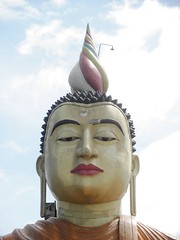Udaipur may be the only place besides Amsterdam where advertising the fact that your cafe has nightly "Octopussy shows" is not a cause for communal outcry. The city is perhaps best recognized as the setting of the cinematic masterpice Octopussy. I was determined to use the opportunity to compose and film a short, loosely-connected sequel called Dodecapussy, starring a cast of myself and 12 Mewari princesses, but as we shall see, Fate did not decree that the Maharaja of Mewar and I should be on good terms.
My introduction to Udaipur was not landing on an island filled with seductive maidens, but being dropped off in a dark alley to look for a man who looks like he would know how to play the didgeridoo. He found me in a courtyard rather helpless and showed me to my room. His name was Guddu. Guddu is the cousin of my homie Raj, and along with an incredibly confusing assortment of his extended family runs a nice guesthouse in the heart of Udaipur, a stone's throw from the massive City Palace. I approached with my usual skepticism. Guddu took me to the rooftop, where there was a chill-out open-air lounge with a pool table, a didgeridoo collection, cushions, and a shrine to Ganesh. Suitable, I thought to myself. Then I saw a poster of baby Krishna playing the flute. A poster of baby Krishna playing the flute partially covered by an Iron Maiden promo. There was no further debate.
I quickly came to know many of Guddu's relations. There was his wife Moniga and his seven-year old son Rajit, undisputed king of the pool table. There was his matronly mother-in-law who clearly was the power behind the throne but took a warm liking to me, and a grumpy father-in-law. The rest of the family tree was a mystery to me but it was impossible not to be aware of Jheeni, the adorable toddling girl whose silence broke predictably every morning with impassioned screams for her favorite relatives to attend to her. As a friend of the family, I was boarded in Rajit's bedroom, a source of considerable confusion to the numerous infants who kept wandering in.
Among the guests, who were always outnumbered by relatives, were two whom I befriended quickly, a cantankerous conspiracy-espousing Dane with frequently vocalized opinions regarding atheism, socialism, and the volume of Indian wedding celebrations; and a rotund, affable Dane who was formerly a practicing Hindu monk and is now attempting to open a heavy metal bar in Kathmandu. Joined by myself, Guddu, and prodigious amounts of charas, these characters held weighty discussions on faith, human nature, politics, and the future of India over a soundtrack of Iron Maiden classics. My stay in Udaipur repeatedly extended itself.
My first touristic stop was by neccesity the City Palace. This palace is the largest in Rajasthan and the second-largest in all of India, a country that takes its palace-building very seriously. It is composed of eleven large wings, and contains multiple historical museums and luxury hotels. Needless to say portions of it were very fine and I enjoyed it greatly. Leaving the palace I ran into a group of wealthy tourists. Udaipur, home of some of the most famous hotels in the world, is full of these types. I was clearly not fitting in to the clique I found myself in. They complained that the palace was too labyrinthine (which it was) and haphazardly designed, almost spitting when they proclaimed their distaste for its asymmetry, and segued into a huffy and mind-blowingly ignorant exposition of the aesthetic inferiority of the Orient. Never one to allow rich people to go unmolested, I interrupted "So I suppose you like that Palladian bullshit? Bitch, please" which drew rather startled reactions. Their stares, eyes shining bright through the shade cast by their Martha's Vineyard visors, grew only more bewildered as I delivered a blistering architectural treatise in which I compared the Rennaissance to a 9-year old child insisting on being breastfed by ancient Rome and made other criticisms which I immediately realized were a bit nonsensical but conveyed the spirit of what I was trying to say, which was that snobby rich pricks can go fuck themselves, preferably on another continent.
It's wedding season in India. The astrologers that encourage half of India to get married at the same time must be punished, because the proliferation of Indian marriages also proliferates Indian marching bands. These bands may be the worst musical ensembles on the face of the globe. Your high school marching band? Much better. Your middle school marching band? Still better. Some random assholes given an assortment of horns? As long as they stay out of the street, still better. Indian marching bands, which head the innumerable processions bringing city traffic to a standstill, are composed of three main elements: the Wagon, the Drums, and the Horns. The Wagon is a wheeled cart covered in ornamented sheets of tin, which carries electronic speakers blasting horrible unmelodic crap, apparently scoured from napkins found in the rubbish bins of drunken English military officers, at great volumes. Behind the cart follows a mobile generator, chugging along to power this infernal contraption. Both the generator and the Wagon are pushed slowly onwards by Indian men of all ages in dusty and outrageously ill-fitting marching band uniforms. The Drums are a group of drummers, who are quite capable of keeping a decent marching rhythm on their snares. Alas, tragically and incomprehensibly, this is rarely the same rhythm being blasted by the Wagon's subwoofers. Finally there is the Horns, a group of horn players who have apparently not learned how to play most of the songs. Though they occasionally join the drummers in performing with loud honks, they mostly remain silent, carrying their instruments purely for show while the Wagon produces all the actual "music." They are typically found in the front of the procession, frequently causing them to be awkwardly stranded ahead of the rest of the band as the Wagon tends to get stuck as traffic tries to pass around it, and the marching band it not actually trained in marching and nobody signals to the front that the rest of the band has stopped. From time to time the Horns surrender all pretense of being musicians, and are called upon to help push the Wagon uphill.
I hate Indian weddings. In fact, I rather dislike most things to do with Indian weddings. I told my Indian friends as much, and to my surprise they emphatically agreed. "Everybody hates these weddings. All these bands, all these fireworks. We are having to go to too many weddings. We are invited to weddings we do not know the people getting married. They like big wedding so cousins, brothers, friends invite their friends, we have to come. So much trouble for everybody. Just have wedding and finish, please." I then asked them if they would do the same at their weddings. "Well, yes" they responded.
This is why India never solves any of its problems.
I went on a thoroughly unedifying trip to Chittaurgarh and became rather glad that the Maharaja of Mewar got his ass kicked so bad he had to found Udaipur. Then as I made my way back to the guesthouse I discovered that the current Maharaja was hosting a wedding. After passing no less than five godawful marching bands on their way to commoners' nuptials I saw the preparations being made for the royal event. Men were hoisting timpanis onto a painted elephant. I spent the night indoors. Not that it helped.
After a tumultuous night of listening to the nearby royal festivities I took it upon myself to explore the lake. Udaipur is built on the edge of Lake Pichola, which not only contains water, but also contains two islands on which are built some very exotic palaces. The white-washed Lake Palace occupies its entire island and seems to float like a ship. This is the Palace from Octopussy, and guess what, the Maharaja now runs it as a ludicrously expensive hotel and you can't go in. I toured the lake by boat, grumbling at the Club Med types all around me. We did however land at Jag Mandir island, which is only mostly a luxury hotel run by the Maharaja, who out of love for his country and culture also allows any visitor to go to the cafe which serves 430-rupee sandwiches. Breaking away from the group, I slinked off to an off-limits part of the island, where (surprise) I found the detritus of yet another very expensive wedding. I spent some time hanging with the laborers whose job it was to carry away the acres of red carpeting, portable chandelier holders, and gold spray-painted pseudo-Greek plywood columns before I was brusquely ejected from the premises by a foreman who was none too happy to have an outsider witness the working man's efforts that make such extravagance possible. He probably also heard the part where I was half-jokingly fomenting insurrection against the higher castes.
I returned to the guesthouse to relax. As the Danes and I amused ourselves chatting with the children, one of Guddu's Indian friends literally brought a puppy over to play. This place is too good to be true.
The next day I made a mammoth tour of the southern Aravallis, traveling deep into the rural heart of the hills past farms where oxen still raised irrigation water in a wheel and women carried buffalo-sized piles of leafy green vegetables on their heads. The road was less than a full lane wide, and my driver, whose name I could not discern through his phlegmatic and mumbled Mewari, was a simple and shy man who somehow navigated this road without being forced off a cliff by herds of sheep. As we got even deeper into the hills the farms gave way to wilderness. Leopards were said to be around. I saw only apes. The Hanuman monkeys are so human in their behavior it is almost creepy. Kumbhalgarh and Ranakpur were both amazing.
Returning to Udaipur again I made my way to an old mansion that now houses a cultural museum, including a multi-room turban gallery. A turban gallery. I had to see it. Within this turban gallery, which to my satisfaction contained many fine turbans, was no other than the World's Largest Turban. I can die happy.
I am however, more likely to die in an Indian prison, as any one of the several netcafe owners who refused to print the requisite hundreds of copies of my gazette-sheet libeling the Maharaja --as among other things a pedophile, a financier of terrorism, and a werewolf-- could easily report me to the authorities.
Finally, after several more days of vegetation, it was time to leave. I said my goodbyes to Guddu and the Danes, to Rajit and Moniga and the smiling old matron. I conducted some quick business and went to retrieve my things from my room. As I left, the last thing I saw was little Jheeni riding a live tortoise along the balcony.
Udaipur will be missed.
Dec 3, 2009
Subscribe to:
Post Comments (Atom)









No comments:
Post a Comment
Commenting Rules:
1)No spam, viruses, porn etc.
2)DO NOT POST GF-B's REAL NAME
3)Remember this is a public website, don't provide sensitive info about yourself in the internet!